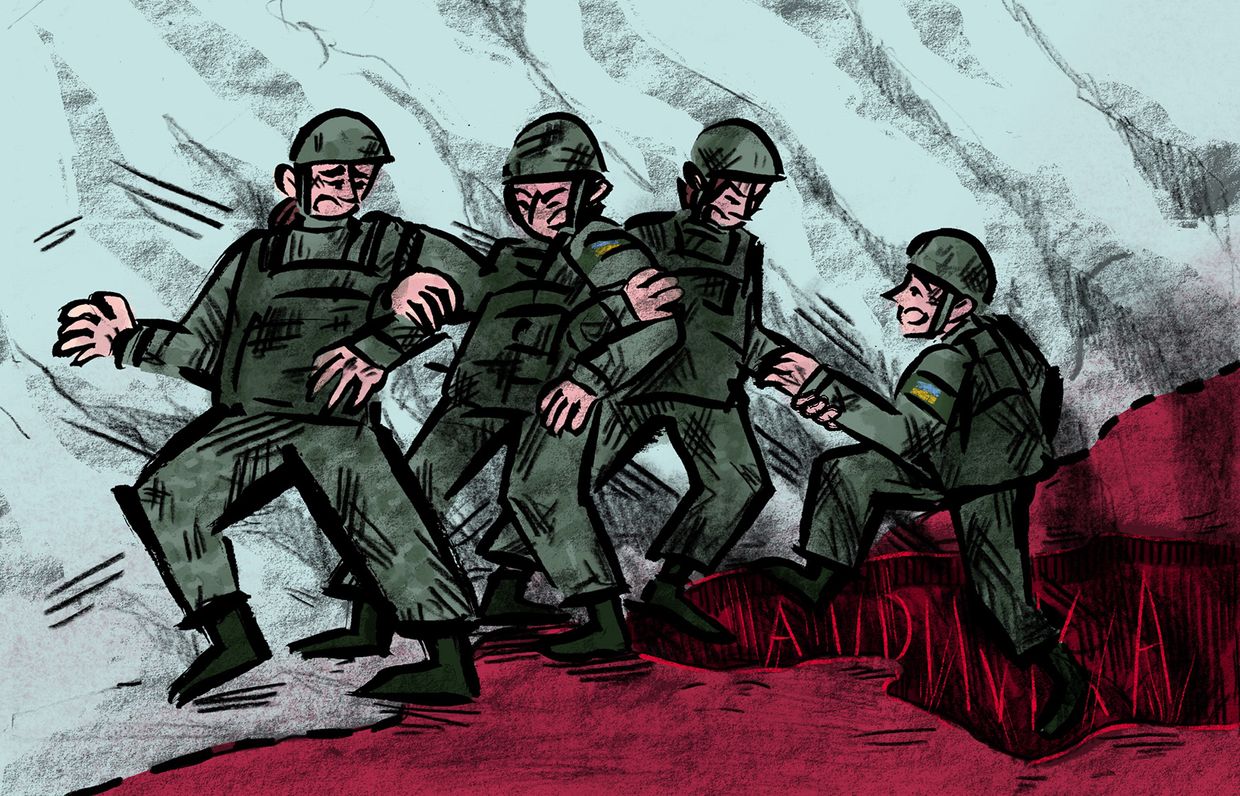After 10 years of war, Krasnohorivka in new danger as Russia advances in the east

Civilian riding a bike on Feb. 2, 2024 in Krasnohorivka, Donetsk Oblast, Ukraine. (Olena Zashko/The Kyiv Independent)
Editor’s note: Due to fear caused by the tense environment in Krasnohorivka and the possibility of their city being occupied by Russian forces in the future, some subjects interviewed declined to give their last names.
KRASNOHORIVKA, DONETSK OBLAST – On the streets of the small industrial city of Krasnohorivka, just outside occupied Donetsk, the term “full-scale invasion” is rarely heard among locals.
Here, the event that brought Ukraine to the brink of annihilation and heralded a dark new chapter in world history is simply when the guns got a lot louder.
“I’ve been living like this since 2014,” said 73-year-old Volodymyr Lytvynenko to the Kyiv Independent as he lined up with his brother to receive humanitarian aid.
Lytvynenko, a pig farmer by trade who now lives in his basement and survives off his pension and the aid brought mostly by religious organizations, starts listing recent shell and rocket hits in his neighborhood.
One two months ago, one seven, one a year and a bit ago; when day-to-day life becomes an exercise in survival for years on end, the accurate recollection of time starts to lose its meaning for many.
“The last two years have been really tough,” he said.
On the southern edge of the city, an abandoned, half-destroyed petrol station sits quietly beside a large roundabout. The column displaying fuel prices still stands proud: all the labels remain frozen at around Hr 16 ($1.43 at 2014 exchange rates) per liter.
The last time fuel was that cheap, and the hryvnia that strong, was almost 10 years ago.
Fighting broke out in Krasnohorivka in spring 2014, when Russian proxy forces set up several checkpoints controlling the roads in and out of key settlements in Donetsk Oblast.
Ukraine liberated the area in August that year, but the front line remained less than two kilometers outside the city.

Before the war, Krasnohorivka was, like Avdiivka, a satellite city of the regional capital of Donetsk.
Of the city’s pre-war population of 16,000, many residents had moved from Donetsk to work in the local materials factory.
Since the launch of Russia’s full-scale invasion, while some of the war’s heaviest fighting has been fought nearby, Krasnohorivka has been a zone of relative calm.
Outside the city, front-line positions have barely moved since February 2022, but that is beginning to change.
Northeast of Krasnohorivka, Russian forces have been advancing deeper into Donetsk Oblast following the fall in mid-February of the Ukrainian stronghold of Avdiivka.
On Feb. 28, Ukraine’s Third Assault Brigade, which had only recently arrived in the area, reported repelling a Russian attempt to break into the city for the first time.
According to the brigade, Russian soldiers did at first manage to entrench themselves in some of the city’s outlying buildings before being expelled.
The roundabout marks a turnoff to the road to the open plain of rubble and ruin that used to be the city of Marinka.
After 22 months of heavy fighting, Russian forces took the last streets of the city in December last year.
Normally, this intersection, between 1-1.5 kilometers from forward enemy positions, would be in easy range of Russian mortars, FPV (first-person-view) drones, and tank fire from Marinka.
In the thick fog of the winter morning, it’s much safer to move around.
Deprived of mobile connection and other basic utilities, residents of Krasnohorivka maintain semblances of ordinary life, seemingly oblivious to the sheer proximity to Russian forces.
Just by the roundabout, Iryna, 56, mops the floor in a small convenience store.
Maintaining a cheerful mood as best as she can, Iryna acknowledges that the intensity of fighting has increased recently; the gaping shell hole in the mud just outside the shop is all the proof one needs.
“It was a week ago, maybe two,” she said. “But I don’t pay attention to these things.”
“God protects us, we feed the people… god bless.”
As is often the case in eastern Ukrainian cities like Krasnohorivka, once the heartland of supporters of ousted pro-Russian President Viktor Yanukovych, the political opinions of locals can get messy and confusing very quickly.
“A lot of people here, they don't care. Maybe some are still tempted by the idea of cheap gas,” said 47-year-old Vitalii at the aid distribution point, who switched to speaking Ukrainian after the war began in 2014.
“We need to call things what they are. War is war, and a neighbor who attacks a neighbor is an aggressor.”
With the war already at their doorstep in 2014, locals often found themselves isolated from Ukraine’s path following the EuroMaidan Revolution, where special police killed over 100 protestors before Yanukovych fled to Russia.
Contempt for Moscow’s campaign of destruction often goes bizarrely hand-in-hand with old political loyalties, as in the case of Lytvynenko.
“I am against them (Russia), I was born in Ukraine, worked here, retired here,” he said. “I don't plan to change anything, that would be treason.”
“But I have one question to Yanukovych, why did he abandon the country? He could have taken some fire trucks and soaked that Maidan and everyone (pro-European protestors) there who were against Ukraine.”
If locals’ views haven’t changed over 10 years of war, Vitalii said, there is little hope that they can ever be.
“There is a saying, some people can only be fixed by the grave,” he said. “Some people thought that way before the war, or before the full-scale invasion, and some will keep on thinking that way until the end.”
“My views since 2014 haven't changed, I take my stand with my language.”
Hard of hearing and suffering from poor mobility, 72-year-old Serhii Kashelkovskyi’s world is bound by the confines of the tight, dark basement of his apartment building.
His wife, 59-year-old retired factory worker Larysa Kashelkovska, still visits the surface when it is safe.
She is responsible for both their survival: gathering food, firewood, and pensions on a regular basis.
The two spend their nights on a damp sofa bed together, with pots and pans hanging above, wrapped in plastic bags to protect them from the dust that falls when a shell hits nearby.
The picture of their life is a familiar one for civilians all across the front line: heat from wood-burning stoves, food and water from humanitarian aid.
“We got used to it, you can get used to anything,” Kashelkovska said.
“When they start shelling, we know what they are and where they are coming from, we go together (with her sister) to the cellar to wait for it to pass.”
The couple lives in the old city center, a little further back from Russian positions; occasionally, they even get some electricity in the basement.
For Kashelkovskyi, it’s a blessing, and allows him to stay busy and connect with his family far away.
On an ancient computer dragged down into the cellar, he labors away at animated slideshows of his grandchildren.
Rudimentary love hearts dance around the photos as the words “I Love You, My Dears” appear on the screen and sentimental guitar music plays in the background.
Despite his health problems, Kashelkovskyi, like most residents still living in front-line settlements like Krasnohorivka this long into the war, refuses to evacuate.
Two years into the full-scale war, government support for internally displaced people remains minimal, and those without other support networks often find themselves exploited or languishing in poverty.
“Where could I go?” he said.
“If we were still in a state to work, maybe we could go somewhere… but no, home is home.”
The home Kashelkovskyi refers to has already suffered from two direct hits from Grad rockets.
“We dream of peace, only peace, to see our grandchildren and daughters,” Kashelkovska said, surveying the damage.
The silence is broken by two thundering crashes, after what had been a relatively quiet morning thanks to the fog.
By now though, the sun was up, the sky was clear, and Russian forces had just dropped two gliding bombs on the city, several kilometers away.
It was time to leave, but for Kashelkovska, it was back to the basement.
With Russia slowly advancing across the front line, and the level of destruction only increasing, the situation for people in cities like Krasnohorivka can and will only get worse.
For people like Kashelkovskyi though, the decision has been made.
“If it was 20 years ago and they offered me to leave, I would,” he remarked with a drawn-out sigh.
“But now... I mean, what's the point?”

Editor’s Note: The Kyiv Independent is grateful to our members and donors. This story wouldn’t have been possible without a donation from The Charles Douglas-Home Memorial Trust.
Note from the author:
Hi, this is Francis Farrell, who wrote this piece from on the ground in the middle of Russia's neverending assault on Ukrainian cities in Donetsk Oblast. I know that sometimes, stories about civilians in front-line towns can end up reading in a similar way, but it's worth remembering that all these characters are individual human beings living through hardship that we could never imagine from our comfortable homes. See above for the video version of this story, and please consider supporting our reporting.


























